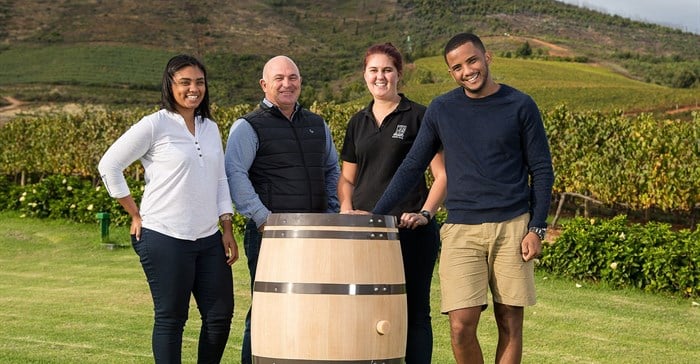Second-year Cape Winemakers Guild Protégés Morgan Steyn of Riversdale, Gynore Fredericks of Malmesbury and Elouise Kotze of Brackenfell, have been given a chance to express their creativity and make their very first wine - now safely in the barrel after the 2018 harvest.

Left to right: Gynore Fredericks, Andre Kotze (MD of Cape Cooperage Group), Elouise Kotze, Morgan Steyn
Crafting their own wines is an essential part of the second year of the Cape Winemakers Guild Protégé Programme and has been made possible by the continued sponsorship of French oak barrels by the Paarl based Cape Cooperage Group for the past eight years. The Cape Cooperage Group also assists the protégés by guiding them through their choice of barrel and helping them achieve the particular style of wine they envision.
From vineyard to bottle
“These Protégés are the future ambassadors of our wine industry. To experience their willingness to learn from our expertise in making the right choices of Quintessence and Tremeaux French oak barrels for their quality wines makes us very proud to be a sponsor. This programme is part of the future of South African wine, and these protégés will carry on the traditions of the wine industry as it has been passed on to them,” says André Kotze, managing director of Cape Cooperage Group.
Besides producing their own wines, the protégés learn how to prepare budgets, production plans and marketing proposals. This gives them valuable experience and insight into the entire winemaking journey, from the vineyard to the end product in the bottle.
A Sauvignon blanc and Semillon blend
With the guidance of Morné Vrey at Delaire Graff, Steyn is making a Sauvignon blanc and Semillon blend. He wants his wine to show others the beauty of a Bordeaux-style white blend. Steyn became interested in wine when his teacher spoke about the industry in his agriculture class. It was the language of wine that enticed him to pursue this career.
“I want to be a winemaker that leads by example and brings change to the industry. I want to follow in the footsteps of my mentors because I can see their love for wine. If this love is nurtured, the wine industry will flourish,” says Steyn, who wants to learn as much as possible during his time in the programme.
An elegant and soft Pinot noir
Fredericks, with the guidance and knowledge of Charles Hopkins at De Grendel, is trying her hand at Pinot noir. The mystery of how to create a glass of top quality wine from grapes, motivated her to study winemaking.
“I chose Pinot noir as I have never worked with this cultivar before and it is a variety with so much potential. It has an elegance and softness to it that I believe is inherent in every woman,” explains Fredericks, who would love to be a mentor and inspiration to others in the wine industry.
Rhône-style South African Viognier
Kotze, who is based at Saronsberg under the watchful eye of Dewaldt Heyns, has chosen to make Viognier after falling in love with the Rhône cultivars while spending a harvest in France.
“My wine is fermented in a water treated barrel with a lower toasting to preserve the floral and fruit aromas that Viognier is known for. My mentor has taught me valuable techniques on treating this cultivar reductively while still highlighting the freshness of the wine and incorporating the Rhône-style into a South African Viognier,” says Elouise, who decided to become a winemaker at the age of 16 after reading an article about women in the industry.
Up for auction at the annual Nedbank Cape Winemakers Guild Auction
Special presentation packs of their wines will be auctioned in 2019 at gala dinners in Johannesburg and Cape Town and at the silent auction that takes place at the annual Nedbank Cape Winemakers Guild Auction. The funds raised at these events are ploughed back into the Protégé Programme to support the development of future winemakers and viticulturists.
Established in 2006 under the auspices of the Nedbank Cape Winemakers Guild Development Trust, the CWG Protégé Programme gives aspirant winemakers and viticulturists the rare opportunity of working side by side with members of the Guild. By cultivating, nurturing and empowering promising individuals to become winemakers and viticulturists of excellence, the Protégé Programme plays an active role in the long-term health and sustainability of the industry.
Other annual sponsors supporting the initiative are Consol Glass and Amorim Cork who donate the bottles and the corks for the Protégé wines.































